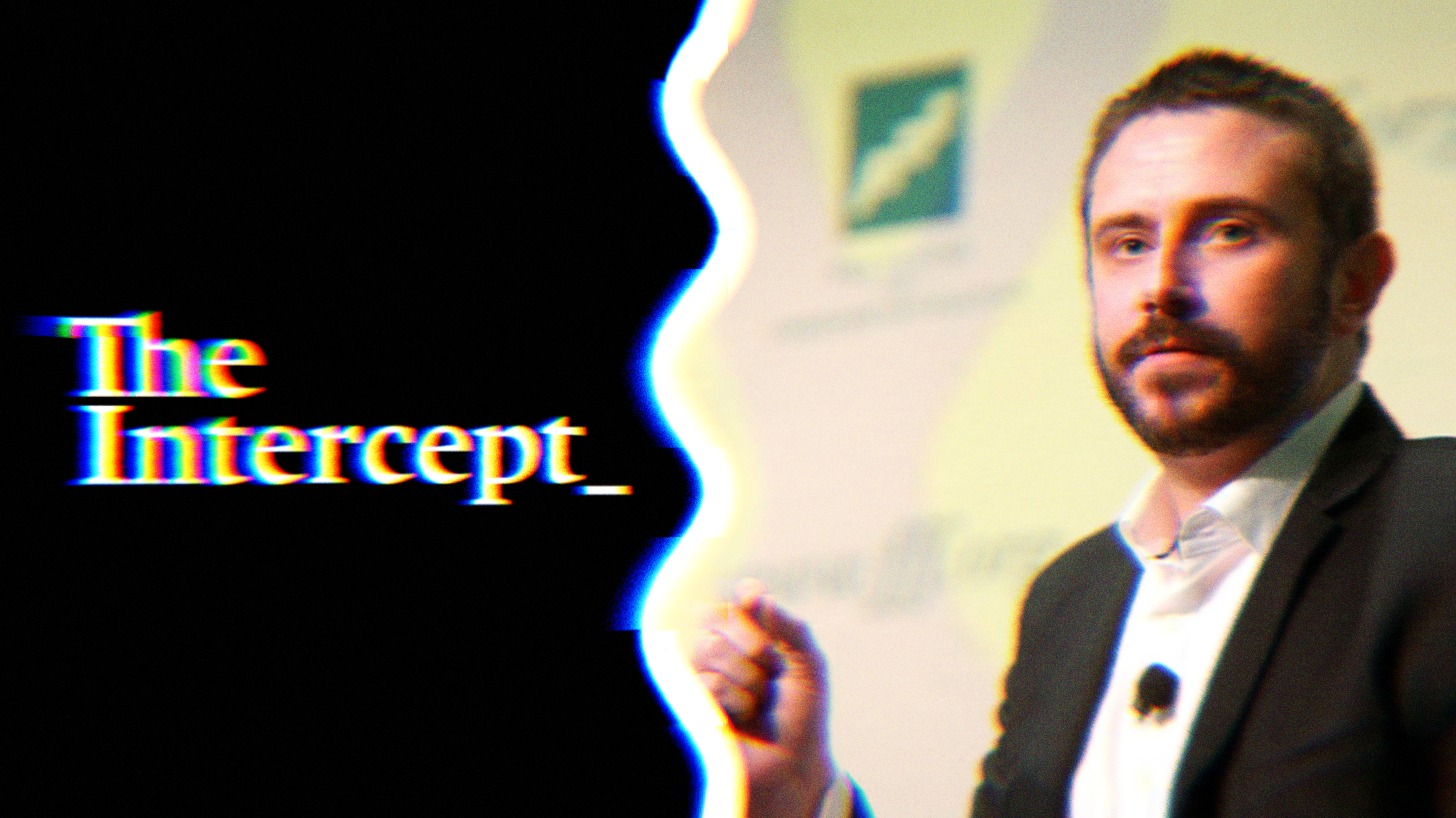Progressive Spotlight: Jeremy Scahill.
Challenging Empire.
 Image Description: The Intercept logo and a photo of Jeremy Scahill.
Image Description: The Intercept logo and a photo of Jeremy Scahill.
The investigative journalist, documentarian, and author is perhaps the go-to source for all things American imperialism. And whenever we’re talking about the United States’ global escapades, hegemony is lurking around every corner.
It’s important to get one thing out of the way before we dive into Jeremy Scahill’s background: We don’t know him personally, but we’d go as far as to say he’d likely bristle at being tied to any specific political ideology, even if we collectively agree that his being on the side of human rights and an adversary of the military-industrial complex would align with him progressive values.
Beyond his principles, Scahill’s resume itself suggests political leanings that, while perhaps not explicitly “progressive,” appear to meet the eye test.
Scahill famously got his start on Democracy Now!, the independent daily news program spearheaded by Amy Goodman, a legendary journalist in her own right.
Before he became a best-selling author, Scahill served as a producer and correspondent for the program, providing crucial shoe-leather reporting inside conflict zones. This includes his work during the NATO-led bombing in Yugoslavia, which killed upwards of 500 civilians, according to Human Rights Watch.
“The extent of the civilian damage in Yugoslavia is unimaginable,” Scahill said during a 1999 segment for Democracy Now! describing NATO’s air raid. “I mean, you see hospitals, schools that have been cluster-bombed, marketplaces, bridges, all sorts of buildings, individual homes, gas stations.”
Providing coverage that rarely made its way onto mainstream news, Scahill produced a series for Democracy Now! called the “Iraq War Journals,” which gave a rare glimpse of the country before George W. Bush’s brutal invasion—all built on a lie. Scahill was there the day Saddam Hussein emptied Iraq’s notorious Abu Ghraib prison—which would later become the site of shocking human rights abuses by the U.S. and a symbol of American war crimes.
Related: Scahill & Grim Leave The Intercept, Are We Living in a Post-Corporate Media Society?
These and other abuses continued to play a central role in Scahill’s work.
He rose to journalistic fame with his 2007 book Blackwater: The Rise of the World's Most Powerful Mercenary Army, which won the prestigious George Polk Award. He followed that up with Dirty Wars: The World is a Battlefield, which he published as both a book and an Oscar-nominated documentary. For anyone who has followed the tragedy that is America’s response to 9/11, Dirty Wars, is this era’s defining work.
This quote from an official involved in America’s illegal extraordinary rendition program effectively characterized this period perfectly:
“If you don’t violate someone’s human rights some of the time, you probably aren’t doing your job.”
Scahill is perhaps now most famous for being the co-founder of The Intercept, along with Glenn Greenwald and filmmaker Laura Poitras. The outlet’s seminal work is “The Drone Papers.” Based on a trove of classified documents, it meticulously breaks down how drones effectively became the dominant way in which the U.S. was prosecuting wars, how strikes were based on faulty intelligence, and included rare insights into the executive branch’s notorious “kill list.”
The Intercept, however, has gone through a tumultuous period, beginning with Greenwald's resignation from the outlet in 2020. Scahill, along with Ryan Grim, left in July to start their own media outlet, Drop Site News on Substack. The pair picked up right where they left off, with Scahill dropping a thousands-word piece informed by interviews with Hamas leaders.
Announcing his departure, Scahill wrote: "A year ago, I never would have imagined sending this email, not to mention publishing on Substack."
"When I speak to young people at universities and schools, I often say that journalism is not just a job, it is a fire that burns in your heart," he added. "I didn’t go to journalism school. I learned to be a reporter the way a carpenter or a plumber hones the skills of their trade, by working as an apprentice. In the mid-1990s, I begged my way into an unpaid gig working for Amy Goodman soon after the launch of the independent radio program Democracy Now! I would get up before the sun and take the train up to WBAI radio station across the street from Madison Square Garden. I would sit in the smoking lounge reading newspapers and wire services of the world and prepare the ten-minute news summary that Amy reads at the top of the show."
"[A]cross the globe," Scahills said, "the struggles to build a just world are also intensifying and international solidarity with Palestine has inspired an unprecedented movement demanding an end to Israel’s apartheid rule and the Western support that enforces it. The world needs solid journalism to tell these stories."
Tragically, Scahill’s professional career coincides with seemingly increasingly horrific military abuses.
The latest mass tragedy is occurring in Gaza, where thousands upon thousands of Palestinians have been killed by a far-right Israeli government recently accused of genocide at the International Court of Justice (ICJ).
Scahill’s reporting on the war has been indispensable, as he’s put the horrors occurring daily there into much-needed context.
While the corporate media continues to mislead the public and provide biased coverage of U.S. hegemony, including its role in the Palestinian slaughter, Scahill continues to remind us all that the Empire is often the cause of so much human suffering.
Image Source
- Gage Skidmore from Peoria, AZ, United States of America, CC BY-SA 2.0, via Wikimedia Commons. Changes were made.
Rashed Mian is the managing editor of the award-winning News Beat podcast and co-founder of the newly launched Free The Press (FTP) Substack newsletter. Throughout his career, he has reported on a wide range of issues, with a particular focus on civil liberties, systemic injustice and U.S. hegemony. You can find Rashed on X @rashedmian and on Bluesky @rashedmian.bsky.social.


